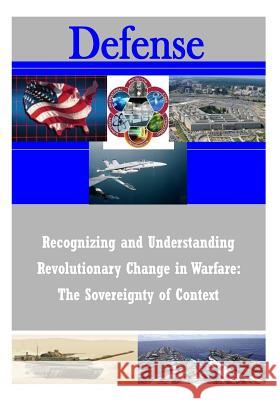Recognizing and Understanding Revolutionary Change in Warfare: The Sovereignty of Context » książka
Recognizing and Understanding Revolutionary Change in Warfare: The Sovereignty of Context
ISBN-13: 9781502929594 / Angielski / Miękka / 2014 / 64 str.
Since 1993 at the latest, when Andrew W. Marshall and his Office of Net Assessment in the Office of the Secretary of Defense (OSD) introduced into public debate the concept of a Revolution in Military affairs (RMA), the idea of revolutionary change in warfare has gripped the official U.S. strategic imagination. All such master notions, or meta narratives, have lengthy antecedents. The provenance of RMA can be traced in the use of laser-guided bombs in Vietnam; in the 1970s "Assault Breaker" project to develop rocket delivered smart bomb lets to target Soviet armor far behind the front; in Soviet speculation about a Military-Technical Revolution (MTR) and the feasibility of "reconnaissance-strike complexes"; in the Discriminate Deterrence reports of the late 1980s (sponsored by then Under Secretary of Defense for Policy, Dr. Fred Ikle, and inspired by Dr. Albert Wohlstetter); by the dramatic effects of stealth and precision in the Gulf War of 1991; and, "off piste" as it were, by a rising argument among academic historians of early-modern Europe. U.S. debate evolved into official commitment. RMA was to be realized as transformation or, for a scarcely less ambitious expression, as revolutionary change in the way American forces would fight. The fascination with revolutionary change persisted through the 1990s, survived, indeed was given "gravity assists" by the newly mandated Quadrennial Defense Reviews (QDRs), by a change in administration in 2001, and was scarcely dented as the dominant defense concept by September 11, 2001 (9/11). Truly it seems to be a big idea for all seasons: for the no-name post-Cold War decade, now for the Age of Terror, and prospectively for whatever the decades ahead will bring. This study provides an audit, a not-unfriendly critical review, of the concept of revolutionary military change. It offers a review of what those who theorize about, and those who are committed by policy to execute, such a revolution ought to know about their subject. As the subtitle of the analysis announces, the leading edge of the argument is the potency, indeed the sovereign importance, of warfare's contexts.
Zawartość książki może nie spełniać oczekiwań – reklamacje nie obejmują treści, która mogła nie być redakcyjnie ani merytorycznie opracowana.











